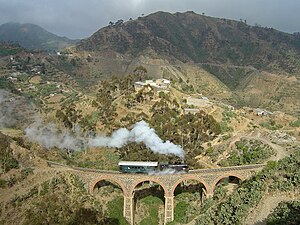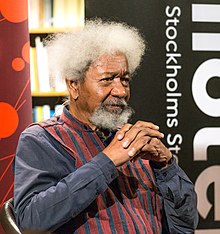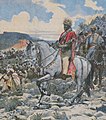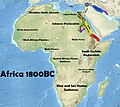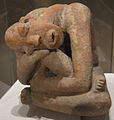Portal:Africa



Africa is the world's second largest and second-most populous continent after Asia. At about 30.3 million km2 (11.7 million square miles) including adjacent islands, it covers 20% of Earth's land area and 6% of its total surface area. With 1.4 billion people0 as of 2021, it accounts for about 18% of the world's human population. Africa's population is the youngest amongst all the continents; the median age in 2012 was 19.7, when the worldwide median age was 30.4. Despite a wide range of natural resources, Africa is the least wealthy continent per capita and second-least wealthy by total wealth, ahead of Oceania. Scholars have attributed this to different factors including geography, climate, tribalism, colonialism, the Cold War, neocolonialism, lack of democracy, and corruption. Despite this low concentration of wealth, recent economic expansion and the large and young population make Africa an important economic market in the broader global context.
Africa straddles the equator and the prime meridian. It is the only continent to stretch from the northern temperate to the southern temperate zones. The majority of the continent and its countries are in the Northern Hemisphere, with a substantial portion and a number of countries in the Southern Hemisphere. Most of the continent lies in the tropics, except for a large part of Western Sahara, Algeria, Libya and Egypt, the northern tip of Mauritania, and the entire territories of Morocco, Ceuta, Melilla, and Tunisia which in turn are located above the tropic of Cancer, in the northern temperate zone. In the other extreme of the continent, southern Namibia, southern Botswana, great parts of South Africa, the entire territories of Lesotho and Eswatini and the southern tips of Mozambique and Madagascar are located below the tropic of Capricorn, in the southern temperate zone.
Africa is highly biodiverse; it is the continent with the largest number of megafauna species, as it was least affected by the extinction of the Pleistocene megafauna. However, Africa also is heavily affected by a wide range of environmental issues, including desertification, deforestation, water scarcity and pollution. These entrenched environmental concerns are expected to worsen as climate change impacts Africa. The UN Intergovernmental Panel on Climate Change has identified Africa as the continent most vulnerable to climate change.
The history of Africa is long, complex, and has often been under-appreciated by the global historical community. Africa, particularly Eastern Africa, is widely accepted as the place of origin of humans and the Hominidae clade (great apes). The earliest hominids and their ancestors have been dated to around 7 million years ago, including Sahelanthropus tchadensis, Australopithecus africanus, A. afarensis, Homo erectus, H. habilis and H. ergaster—the earliest Homo sapiens (modern human) remains, found in Ethiopia, South Africa, and Morocco, date to circa 233,000, 259,000, and 300,000 years ago, respectively, and Homo sapiens is believed to have originated in Africa around 350,000–260,000 years ago. Africa is also considered by anthropologists to be the most genetically diverse continent as a result of being the longest inhabited. (Full article...)
Selected article –

South Kasai (French: Sud-Kasaï) was an unrecognised secessionist state within the Republic of the Congo (the modern-day Democratic Republic of the Congo) which was semi-independent between 1960 and 1962. Initially proposed as only a province, South Kasai sought full autonomy in similar circumstances to the much larger neighbouring state of Katanga, to its south, during the political turmoil arising from the independence of the Belgian Congo known as the Congo Crisis. Unlike Katanga, however, South Kasai did not explicitly declare full independence from the Republic of the Congo or reject Congolese sovereignty.
The South Kasaian leader and main advocate, Albert Kalonji, who had represented a faction of the nationalist movement (the Mouvement National Congolais-Kalonji or MNC-K) before decolonisation, exploited ethnic tensions between his own ethnic group, the Baluba, and the Bena Lulua to create a Luba-focused state in the group's traditional heartland in the south-eastern parts of the Kasai region. As sectarian violence broke out across the country, the state declared its secession from the Congo on 9 August 1960 and its government and called for the Baluba living in the rest of the Congo to return to their "homeland". Kalonji was appointed President. Although the South Kasaian government claimed to form an autonomous part of a federal Congo-wide state, it exercised a degree of regional autonomy and even produced its own constitution and postage stamps. The state, supported by foreign powers, particularly Belgium, and funded by diamond exports, managed numerous crises, including those caused by the large emigration of Luba refugees, but became increasingly militarist and repressive. (Full article...)Featured pictures –
Did you know (auto-generated) -

- ... that economist and anti-apartheid activist Vella Pillay arranged for South African revolutionaries to receive military training in the Soviet Union and China?
- ... that the British South Africa Police's Black Boots support unit were dubbed "terr hungry" for apparently enjoying killing suspected terrorists in Rhodesia?
- ... that nursing educator Helen Turner Watson was one of the first African-American women to become a commissioned officer in the United States Navy?
- ... that despite the United States outlawing slavery in 1865, historian Antoinette Harrell found examples of African-American families who remained enslaved through debt bondage as recently as the 1970s?
- ... that Louis W. Roberts was among the highest ranking African-American space program staff at NASA while the Apollo program was underway?
- ... that Saint Augustine died during the Vandal conquest of Roman Africa?
Categories
Selected biography –
Akinwande Oluwole Babatunde Soyinka Hon. FRSL (Yoruba: Akínwándé Olúwọlé Babátúndé Ṣóyíinká; born 13 July 1934), known as Wole Soyinka (pronounced [wɔlé ʃójĩnká]), is a Nigerian playwright, novelist, poet, and essayist in the English language. He was awarded the 1986 Nobel Prize in Literature for his "wide cultural perspective and... poetic overtones fashioning the drama of existence", the first sub-Saharan African to be honoured in that category.
Soyinka was born into a Yoruba family in Abeokuta, Nigeria. In 1954, he attended Government College in Ibadan, and subsequently University College Ibadan and the University of Leeds in England. After studying in Nigeria and the UK, he worked with the Royal Court Theatre in London. He went on to write plays that were produced in both countries, in theatres and on radio. He took an active role in Nigeria's political history and its campaign for independence from British colonial rule. In 1965, he seized the Western Nigeria Broadcasting Service studio and broadcast a demand for the cancellation of the Western Nigeria Regional Elections. In 1967, during the Nigerian Civil War, he was arrested by the federal government of General Yakubu Gowon and put in solitary confinement for two years, for volunteering to be a non-government mediating actor. (Full article...)Selected country –
 |
 |
||
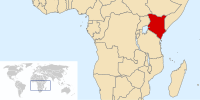
| |||
Kenya, officially the Republic of Kenya, is a country in Eastern Africa. It is bordered by Ethiopia to the north, Somalia to the northeast, Tanzania to the south, Uganda to the west, and Sudan to the northwest, with the Indian Ocean to the southeast. At 224,961 mi² (582,646 km²), Kenya is the world's forty-seventh largest country. Mount Kenya, which reaches 5,199 meters (17,057 ft), is the highest point in Kenya and the second highest in Africa.
Nairobi, the capital, is the primary communication and financial hub of East Africa. It enjoys the region's best transportation linkages, communications infrastructure, and trained personnel, although these advantages are less prominent than in past years. A wide range of foreign firms maintain regional branches or representative offices in the city. In March 1996, the Presidents of Kenya, Tanzania, and Uganda re-established the East African Community (EAC). The EAC's objectives include harmonizing tariffs and customs regimes, free movement of people, and improving regional infrastructures. In March 2004, the three East African countries signed a Customs Union Agreement. (Read more...)
Selected city –

Gaborone (UK: /ˌɡæbəˈroʊni, ˌhæb-/ GAB-ə-ROH-nee, HAB-, US: /ˌɡɑːbəˈroʊni, -neɪ/ GAH-bə-ROH-nee, -nay, Tswana: [χabʊˈrʊnɛ]) is the capital and largest city of Botswana with a population of 246,325 based on the 2022 census, about 10% of the total population of Botswana. Its agglomeration is home to 421,907 inhabitants at the 2011 census.
Gaborone is situated between Kgale Hill and Oodi Hill, near the confluence of the Notwane River and Segoditshane River in the south-eastern corner of Botswana, 15 kilometres (9.3 mi) from the South African border. The city is served by the Sir Seretse Khama International Airport. It is an administrative district in its own right, but is the capital of the surrounding South-East District. Locals often refer to the city as GC or Motse-Mshate. (Full article...)In the news
- 12 February 2024 –
- Two boats collide on the Congo River near Kinshasa, Democratic Republic of the Congo; with the death toll remains unclear. (AP)
- 11 February 2024 – 2023 Africa Cup of Nations
- In association football, hosts Ivory Coast win their third Africa Cup of Nations by defeating Nigeria 2–1 in the final. Sébastien Haller scores the winning goal in the 81st minute. (The Guardian)
- 10 February 2024 – Somali civil war
- Four Emirati soldiers and a Bahraini military officer are killed, while ten other people are injured, when a soldier opens fire at a military base in Mogadishu, Somalia, before being killed in the ensuing shootout. Al-Shabaab claims responsibility. (AP)
- 10 February 2024 –
- A Eurocopter EC130 helicopter crashes near Nipton, California, United States, killing all the six people on board, including Nigerian banker Herbert Wigwe. (CBS News)
- 10 February 2024 – 2023–2024 Senegalese protests
- Violent protests occur in Senegal following an announcement by President Macky Sall that presidential elections have been delayed from February 25 to December 15. (Sky News)
- 9 February 2024 –
- At least 18 people are killed during a collision between a bus and a truck on a road in Kinshasa, Democratic Republic of the Congo. (AP)
Updated: 16:33, 14 February 2024
General images -
Africa topics
More did you know –
- ...that members of the Senegalese rap group Daara J were hired by campaigners in the Senegalese election of 2000 to edit their speeches?
- ...that Senegalese hip hop group Positive Black Soul's name abbreviation, PBS, is a play on that of the Parti Démocratique Sénégalais, PDS?
- ...that Mamadou Diabaté, a Malian kora player, was nominated for a Grammy Award in 2005, but lost to his cousin Toumani Diabaté?
- ...that, in November 2007, The Sowetan published an article which erroneously claimed that South African political activist Dan Mokonyane had died?
Related portals
Major Religions in Africa
North Africa
West Africa
Central Africa
East Africa
Southern Africa
Associated Wikimedia
The following Wikimedia Foundation sister projects provide more on this subject:
-
Commons
Free media repository -
Wikibooks
Free textbooks and manuals -
Wikidata
Free knowledge base -
Wikinews
Free-content news -
Wikiquote
Collection of quotations -
Wikisource
Free-content library -
Wikispecies
Directory of species -
Wikiversity
Free learning tools -
Wikivoyage
Free travel guide -
Wiktionary
Dictionary and thesaurus











